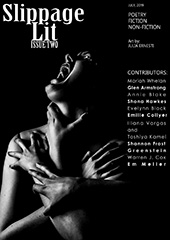New Lit on the Block :: MORIA Literary Magazine
 Olives are a succulent fruit, each containing a seed with which to grow more nourishing deliciousness. What better inspiration, then, for MORIA, the new literary publication from Woodbury University, where an olive grove once stood on the land that now houses this Californian educational institution.
Olives are a succulent fruit, each containing a seed with which to grow more nourishing deliciousness. What better inspiration, then, for MORIA, the new literary publication from Woodbury University, where an olive grove once stood on the land that now houses this Californian educational institution.
Faculty Editor of MORIA Literary Magazine, Dr. Linda L. Dove, tells me MORIA refers to a special type of olive tree in ancient Greece that is protected by the government. “As a tree sacred to Athena, the goddess of wisdom, the original ‘Moria’ was believed to have been planted by her at the Parthenon and includes the meaning ‘to be part of’ something larger than itself. Here at the literary magazine, we recognize and celebrate that Woodbury University is a part of a tradition of learning that is larger than itself, just as literature and the writers who make it are part of a tradition of creative engagement and cultural production that is larger than any one individual alone.” Beautiful.
 Olives are a succulent fruit, each containing a seed with which to grow more nourishing deliciousness. What better inspiration, then, for MORIA, the new literary publication from Woodbury University, where an olive grove once stood on the land that now houses this educational institution.
Olives are a succulent fruit, each containing a seed with which to grow more nourishing deliciousness. What better inspiration, then, for MORIA, the new literary publication from Woodbury University, where an olive grove once stood on the land that now houses this educational institution.
Faculty Editor of MORIA Literary Magazine, Dr. Linda L. Dove, tells me MORIA refers to a special type of olive tree in ancient Greece that is protected by the government. “As a tree sacred to Athena, the goddess of wisdom, the original ‘Moria’ was believed to have been planted by her at the Parthenon and includes the meaning ‘to be part of’ something larger than itself. Here at the literary magazine, we recognize and celebrate that Woodbury University is a part of a tradition of learning that is larger than itself, just as literature and the writers who make it are part of a tradition of creative engagement and cultural production that is larger than any one individual alone.” Beautiful.
Publishing poetry, fiction, and nonfiction annually online in November, MORIA is edited by an undergraduate editorial board, enrolled in “Digital Publication” practicum course at Woodbury University and led/taught by Dr. Dove, who herself has significant professional publishing credits to her name, as well as teaching credentials encompassing 30-years’ experience in the field.
Dr. Dove explains that “MORIA accepts unsolicited submissions which are read anonymously on a rolling basis during the submissions window each year, and decisions are made by the full editorial board as a collaborative review body based on considerations of literary excellence and ‘fit’ with the aesthetics of the magazine, and with some consideration to how individual pieces ‘speak to’ the other pieces accepted for that issue of the magazine in order to create narrative interest throughout the publication.” Writers can expect a response time to submissions in under three month, “often less,” Dr. Dove adds.
“While we accept all styles” the editors offer on the site’s guidelines, “— including experimental, hybrid, and conventional forms — we aren’t interested in submissions of light verse, genre fiction, and any piece that references gratuitous violence or exploitative sexual imagery. We’re committed to publishing a diverse range of poets and writers. In our debut issue (2017), 73% of our authors were women and 24% were writers of color. We also published pieces from writers in their 20s to writers in their 70s — and every decade in between — which we think is right and necessary and which doesn’t happen side-by-side as often as it should in the world of literary zines and journals. We welcome work from traditionally under-represented groups, including women writers, indigenous writers, writers of color, writers who identify as LGBTQ, and writers with disabilities.”
 It was enlightening to learn from Dr. Dove [pictured right] that Woodbury University supports its professional and liberal-arts student interests by offering hands-on experience and real-world connections to its undergraduates and graduate students. As such, Dr. Dove shares, “the Professional Writing Department decided to spearhead the creation of a literary magazine that would publish top-tier professional poets and writers in order to give students the opportunity to edit, manage, and produce a real-world publication with a national and international reach. It is unusual in the world of literary magazines to have an editorial board staffed by undergraduates who are publishing professional poets and writers rather than fellow students. These student editors receive practical, on-the-job experience in curating new work by professional writers – an invaluable training that they can take with them into careers in the publishing world or in any world that requires program-management skills, design, analysis, editing, and writing – which is just about all of them.”
It was enlightening to learn from Dr. Dove [pictured right] that Woodbury University supports its professional and liberal-arts student interests by offering hands-on experience and real-world connections to its undergraduates and graduate students. As such, Dr. Dove shares, “the Professional Writing Department decided to spearhead the creation of a literary magazine that would publish top-tier professional poets and writers in order to give students the opportunity to edit, manage, and produce a real-world publication with a national and international reach. It is unusual in the world of literary magazines to have an editorial board staffed by undergraduates who are publishing professional poets and writers rather than fellow students. These student editors receive practical, on-the-job experience in curating new work by professional writers – an invaluable training that they can take with them into careers in the publishing world or in any world that requires program-management skills, design, analysis, editing, and writing – which is just about all of them.”
When asked about the ups and downs of this start-up venture, Dr. Dove responded, “The greatest hurdle and greatest joy I’ve experienced as the Faculty Editor of this fledgling publication are intertwined, as hurdles and joys often are. It can be challenging to translate the value of literary and creative material into the ‘bottom line,’ empirical criteria that is needed to garner institutional support for such a project, particularly when academic institutions – even private ones – are having to justify their bottom lines and tighten their belts like never before. We’ve been very lucky at MORIA that a project such as ours has received the whole-hearted support of the Woodbury administration, and, as a result, being able to help the students understand themselves as part of the larger community of professional writers has been a true joy of this job.”
Given all these supports and efforts combined, readers coming to MORIA can expect to find poems, stories, and creative essays from both established and emerging professional writers, curated by a staff that is committed to offering a diverse range of experiences, voices, aesthetics, and forms. Recent contributors include Jill Alexander Essbaum, Sarah Blake, Karen An-hwei Lee, Amorak Huey, Lynne Thompson, Kelli Russell Agodon, Neil Aitken, and Martha Silano.
Into the future, MORIA foresees converting their submissions process from email to a digital submissions manager (Submittable) this summer as well as starting a blog as part of the website (the “Athena” Blog) in order to feature book reviews, provide behind-the-scenes glimpses into the editorial process, and to include student writing and spoken-word poetry as part of the MORIA platform. Additionally, Dr. Dove adds, they hope in the not-too-distant future to produce a flip-book version of the magazine as part of expanding their vision of what a digital platform might entail.
For writers, MORIA is seeking submissions for their next issue, which will include a themed section on FOOD. Submissions are open from March 30 to August 30, 2018. Full submissions guidelines can be found here. https://moriaonline.com/submission-guidelines/


